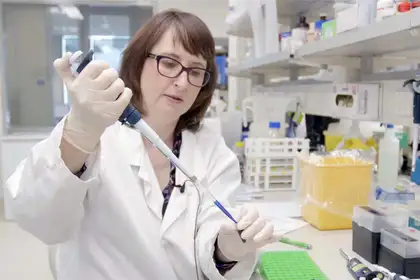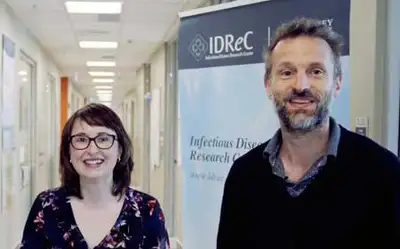
Senior Lecturer Collette Bromhead
The Ebola virus outbreak in West Africa killed thousands of citizens including doctors, nurses and midwives and now Massey is helping to design and facilitate online training for staff in Liberia so they can better understand emerging infectious diseases.
The World Health Organisation for Animals the OIE contracted Massey’s School of Veterinary Science in 2019 to design and facilitate training for laboratory staff in Liberia.
Group Leader in the School of Veterinary Science Professor David Hayman planned trips to and from Liberia, bringing groups to New Zealand for in-person training. In Early 2020, COVID-19 hit the world and travel and in-person training could no longer be provided.
Professor Hayman says the training involved emerging infectious diseases, a subject that is a contemporary issue in Liberia.
“Emerging infectious diseases pose, as COVID-19 has demonstrated, a huge threat to health and society. In West Africa, an Ebola virus disease outbreak that started in 2013 and continued until 2016 caused many deaths, along with social disruption. Liberia lost 8 per cent of its doctors, nurses, and midwives to Ebola virus disease. West African countries are some of the poorest and least well equipped to study and detect infectious diseases. Ebola virus disease is a zoonosis, meaning it originates in animals.
“The main hosts are thought to be bats, but other species have tested positive, and reliable data is lacking. It seems that increased forest fragmentation is increasing the risk of outbreaks. There are problems with capacity to study and detect these viruses in the countries at risk, which is true in the human health sector, but also and particularly in the animal and environmental sectors,” he says.

Collette Bromhead, David Hayman
This EU-funded project, EBO-SURSY, paired different West and Central African laboratories with laboratories from wealthier countries to help develop capacity to study and detect Ebola virus disease and other viral haemorrhagic fever viruses in their animal hosts.
The COVID-19 pandemic then changed the teaching plan entirely and Professor Hayman sought help from the Activate team to deliver online learning.
“We were unable to travel because of flight and border restrictions and disease risk, so they only way to start delivering this material was remotely. However, the project was designed to include lots of in-person laboratory training. I had been thinking about what we could deliver through videos and online teaching, and approached the Activate team for help, and it went from there.”
The Activate team assembled a project team with curriculum developers, a learning technologist, and a multimedia developer to support the teaching staff including
Research Technician Matt Knox and Senior Lecturer Collette Bromhead, to identify the objectives of the training, review the original training design, and work through the options for offering an equivalent asynchronous learning experience tailored to the skilled, mature professionals that made up this cohort.
Activate Senior Curriculum Developer Catherine Stevens says the biggest challenge was identifying how to provide a relevant, engaging, and practical experience to laboratory staff.
“They had very limited computer access and different facilities to those available at Massey University. We were not after passive knowledge 'transfer'. Rather, we set out to design a package that would support the Liberian team to engage with the content, apply their learning in their own laboratory, record and reflect on their results (including any challenges and limitations they encountered), and seek feedback from the teaching team back in New Zealand. They were then supported to apply the feedback and reflections to their next phase of learning,“ she says.
David Hayman adds that the project team played a crucial role in achieving their deliverables and there has been interest in using the training material more widely.
"The knowledge, technical expertise and support from the team allowed us to develop a really high-quality, professional product that will be useful for years to come. It would have been impossible for us to have met our deliverables without this. Our funders were impressed and are looking at how they can use our material to help improve training globally for those working on human, animal and environmental health.”